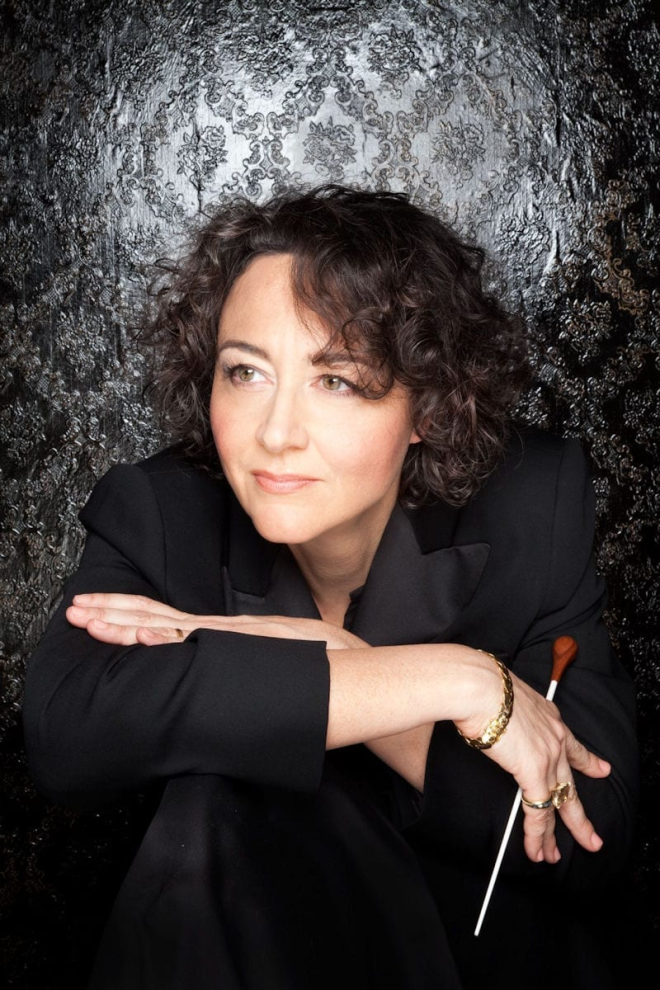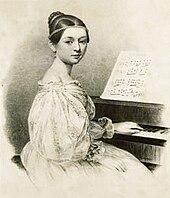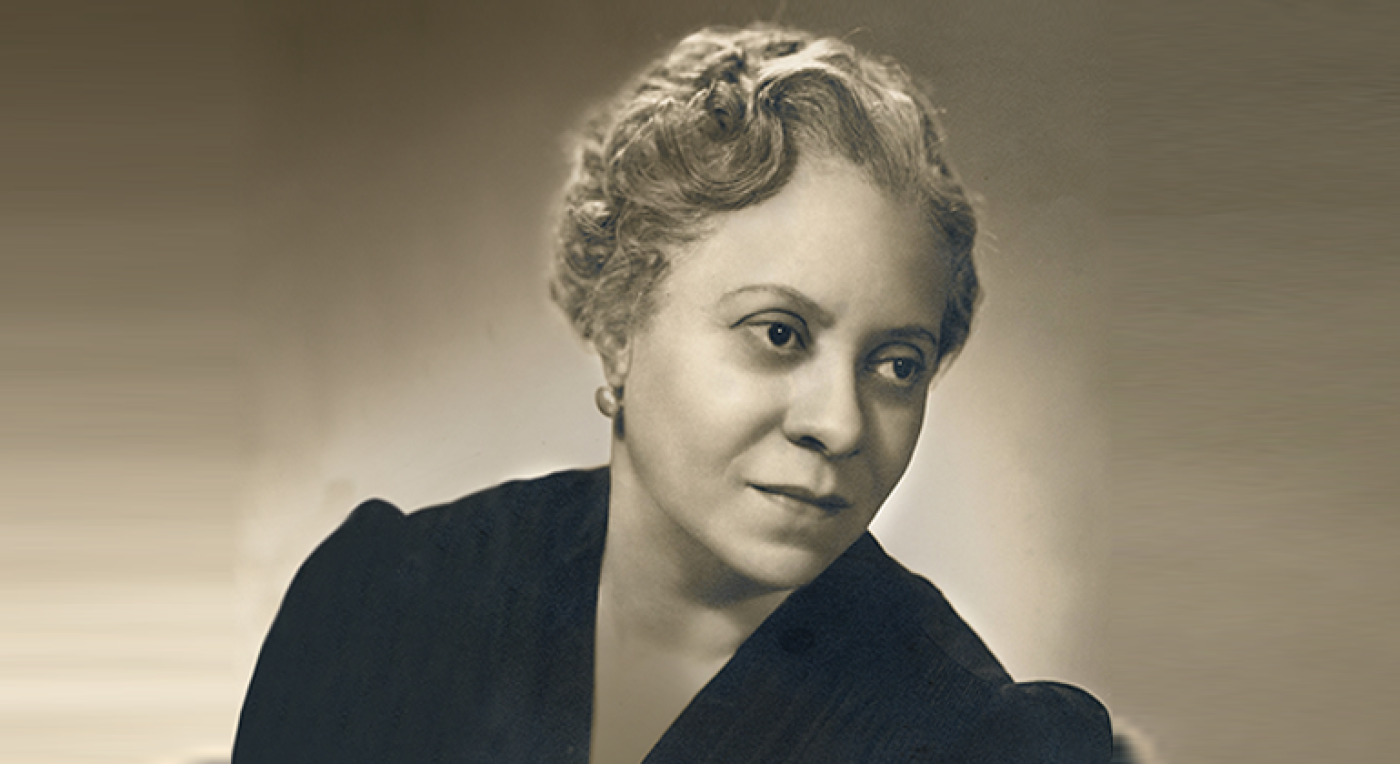Last year I visited Oakcrest school in Vienna, Virginia to chat with members of a high school class that had upset a major election. Music teacher Alix Baldwin led her class in a musical putsch that dethroned Beethoven’s Symphony No. 9 as the perennial winner of WETA Classical’s annual Classical Countdown, awarding first place to Vivaldi’s Four Seasons. The young women in Ms. Baldwin’s class learned a lot in that exercise about civic engagement, and how, with dedication and hard work, you can make a difference in your community.
Inspired by the girls’ commitment, I decided to base my talk on four women who, in my opinion, had found success in the music world through sheer talent and determination: my musical heroines.
I began with Nathalie Stutzmann, the only female music director of a major American orchestra, the Atlanta Symphony Orchestra. Since I spoke with the Oakcrest class, she’s made lots of news. She debuted at the Met, with the New York Times calling her performances “the coup of the year.” Last summer, she became the second woman in history on the podium of the Bayreuth Theater, conducting Wagner’s Tannhäuser to such great acclaim that the 2024 Oper!Awards named her “Best Conductor of the Year.” (Last year’s winner was Gianandrea Noseda). Stutzmann also chairs the La Maestra competition in Paris, an international contest exclusively for women conductors (this year’s winner was just announced: 34-year-old Israeli, Bar Avni).
Why do I consider Stutzmann a musical heroine? Well, on a personal level, she is eloquent and open, with a gift for communicating her passion for music. She says she always wanted to be a conductor. She attended the conducting class at the Conservatory as a teenager and couldn’t understand why the male students got to lead the student orchestra, while she wasn’t even allowed to have the baton.
She realized the time wasn’t right for a woman to be a conductor, so she devoted herself to singing. She has a unique contralto voice, and she became famous for it, performed for great conductors, observed them, and finally found mentors among them.
She also formed her own small ensemble, Orfeo 55, about a decade ago and conducted them while singing. The last album they made together is called “Contralto.”
This recording introduced me to a fascinating bit of history. We’ve all heard of the castrati; women weren’t allowed to sing in church so the authorities tortured young boys so they could sing high even when they were men. The boys received rigorous musical training and many became the Baroque equivalent of rock stars. But they were expensive. Most composers couldn’t afford more than 1 or 2 castrati in their productions. The rest of the cast was made up of lower paid (!) women contraltos...not as highly trained, but willing to travel and sing the roles. Some of these women became famous in their own right. And many have extraordinary stories. One of Handel’s contraltos, for example, claimed she was a lady, and was planning to marry an Earl, so she petitioned the opera board of directors to ask Handel not to make her role too passionate, vulgar, or unladylike. One of the most famous of these women was Anna Giró, Vivaldi’s student and lifelong muse for whom he wrote 14 roles. She too, eventually married a nobleman.
Nathalie Stutzmann said in a recent interview, in French, and I’ll try to translate it: a conductor must not only “inspire music” but must also “perspire” it. One musician who certainly “perspired” music, whose whole being was suffused with music, was Clara Wieck Schumann (1819-1896).
Her father was a music teacher, and he considered Clara his masterpiece—the proof that his system of education worked.
To say she had a difficult life doesn’t begin to describe her many challenges. She underwent rigorous training as a child prodigy. She had to sue her father for the right to marry the love of her life, Robert Schumann, who died in an asylum leaving her with 8 children. After her husband’s death, she became the only source of support for the entire family. She played through physical pain, and through the many tragedies that beset her. A memoir by her youngest daughter, Eugenie, describes the organizational miracles she pulled off. The eldest daughter, Marie, was her mother’s right hand, planning her concert tours, sewing clothes for the whole family, and teaching her brothers and sisters. The family would gather again during the summer season, but the rest of the time, Clara was touring, and the kids were dispersed to various relatives, friends, and boarding schools, some of which, Eugenie said, were reminiscent of the horrific institution described in the novel Jane Eyre.
How can you not admire Clara’s determination, grit, and devotion to art? Her eldest son had to be put in a mental asylum, 2 of her sons died of TB, another daughter died in childbirth. The hits kept coming for Clara, but still she carried on an incredible performance schedule all over Europe.
Another notable example of this courageous tenacity is the American composer Florence Price (1887-1953) who is finally getting the respect and performances she deserves.
In 1943 Price wrote a heartbreaking letter to Serge Koussevitsky, the conductor of the Boston Symphony Orchestra:
“I have two handicaps...I am a woman; and I have some Negro blood in my veins. Knowing the worst, then, would you be good enough to hold in check the possible inclination to regard a woman’s composition as long on emotionalism but short on virility and thought content...I should like to be judged on merit alone.” Price wrote seven letters to the unresponsive Maestro between 1935 and 1944. It wasn’t until March, 2019, that the BSO finally performed her Third Symphony. Yannick Nézet-Séguin and the Philadelphia Orchestra recorded a Grammy winning disc of her first and 3rd symphonies in 2022.
Price grew up in Arkansas, daughter of a prosperous dentist, and was accepted to the New England Conservatory of Music where she double majored in organ and piano pedagogy. She also studied composition privately. She inherited Dvorak’s philosophy that folk music--music of the people--was the basis for a national style. After graduation she returned home to Little Rock. Eventually, she and her husband and daughter were forced to escape to Chicago to avoid the horrors of the increasingly threatening Jim Crow South. In Chicago, she participated in the Chicago Renaissance of Black artists and musicians. Her first symphony was performed by the Chicago Symphony Orchestra as part of a Black music festival, making her the first woman—not to mention the first Black woman-- to have her symphony performed by a major orchestra. She introduced her signature “Juba Dance” in the symphony’s 3rd movement, and subsequently included the Juba in all 4 of her symphonies. The Juba is a percussive dance imported from Africa by slaves and thought to be the precursor of tap dancing. Slaves were forbidden drums because owners feared they would beat out secret messages, so they were forced to use their bodies as percussion instruments. Sadly, Florence Price died just before going to Paris to receive an award, on the cusp of international recognition.
Another musical heroine, Tania Léon was born in Cuba nearly 81 years ago and was a recipient of the Kennedy Center Honors in 2022. She is a noted conductor, composer, educator, and advocate for contemporary music.
Léon escaped Cuba at 24, and went to New York to further her education, becoming a protégée of big names including Leonard Bernstein. Now she advocates for other musicians and for classical music. She won a Pulitzer Prize for her composition “Stride” commissioned by the New York Philharmonic Project 19 celebrating the centennial of the 19th amendment which gave women the right to vote.
"Stride” was written in honor of Susan B. Anthony...who strode forward no matter what obstacles were in her way. Léon says she imagines a gigantic woman with very big legs walking. “In the piece there’s a section where I try to ...propel movement with percussion mixed with trumpets. The piece doesn’t end, it keeps going because it’s very fluid. With Stride I feel courage, that inner force that one may have inside that says ‘keep going’.”
All these women, and so many more who inspire us in all fields of life, share that quality: “that courage, that inner force that one may have inside that says KEEP GOING.”
PBS PASSPORT
Stream tens of thousands of hours of your PBS and local favorites with WETA+ and PBS Passport whenever and wherever you want. Catch up on a single episode or binge-watch full seasons before they air on TV.



